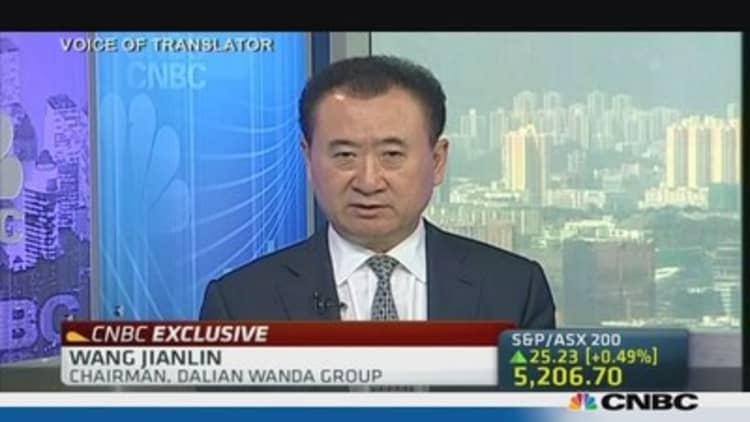Hooray for Chinese Hollywood?
That's the tune China's richest man, Wang Jianlin, was tapping to last weekend, as he kicked off construction of a massive entertainment complex on China's northeastern coast.
Featuring a attended by film mogul Harvey Weinstein and A-listers Leonardo DiCaprio, Nicole Kidman and John Travolta, the festivities formally announced a planned 2016 launch of the $8.2 billion Qingdao Oriental Movie Metropolis, a studio theme park set to showcase 20 film studios, eight hotels, two museums and a Chinese version of Los Angeles' iconic "Hollywood" sign.
For real estate mogul Wang, whose Wanda Group just acquired U.S. cinema chain last year, the adapted sign is not just an homage to Hollywood, but a statement on the global prominence that he envisions China's film industry achieving.

In a speech, Wang pointed to the size and rapid growth of the Chinese market, saying that China is "the future of the development of the world film market." He also touched on ambitions to "change the status quo of China's lack of global film brands," while counseling international players that "the first to cooperate with China will be the first to reap the benefits."
Now, some are asking, can China build a global film industry with influence on par with Hollywood?
It's possible, in theory, say analysts and industry insiders, but it will take more than a little time, talent and treasure, as well as trans-Pacific collaboration.
(Read more: The 15 biggest box office bombs of all time)
Greg Coote, a prominent industry financier and founder of Village Roadshow Pictures, said that attracting global talent, more than anything, is the key to becoming a global player.
"It's not as simple as 'If you build it, they will come,'" he said. "A studio is just a big tin shed with a bunch of special lighting in it. It doesn't mean anything. What you need is talent to move out to China."
Ben Mogil, an analyst at Stifel Nicolaus, agreed.
"The challenge would be attracting non-domestic talent," said Mogil, who nonetheless noted that "Money overcomes a lot of things."
While China has plenty of investment capital, monetary incentives for international film production companies, including production cost rebates, are an area that needs to be improved, said Coote.
"You have to make it worth their while," he said. "In Australia, the government will cut you a 40 percent rebate. In Malaysia, it's 30 percent. There are no incentives to go to China."
(Read more: James Bond submarine car fails to wow at auction)
But it's about more than dollars and cents. Censorship is also a factor.
"How much does the political landscape impact the content that's being produced?" asked David Bank, an equity research analyst at RBC Capital. "Hollywood is a pretty free market, so can you have success in content production without having an open and free media market?"
Another question, Bank says, is whether China, with its ongoing push to increase its "soft power" and disseminate its own culture, can make films that will resonate with international audiences.
"The global franchises that work are culturally neutral," said Bank. "What culture does 'Pirates of the Caribbean' touch on? What cultures do the 'Batman' series and Marvel series touch on? These are culturally neutral."
(Read more: Hot cars from the Shanghai auto show)
Townsend Buckles, an analyst at JPMorgan, also sees culture as an issue.
"The challenge is exporting some of the Chinese cultural elements that you would imagine would be part of some of these films, and making them broadly appealing to foreign audiences," said Buckles. "I don't think you've seen too many films step into that realm."
Building a "new Hollywood" looks daunting from any angle, said Vasily Karasyov, a research analyst at Sterne Agee. Daunting doesn't mean impossible, he said, but it will take time, at the very least.
"It's like someone on an island in Florida somewhere saying we're going to build a new Hong Kong," said Karasyov. "It sounds difficult to achieve."
—By CNBC's Adam Molon.

